英文版 西方文化热
西方文化课堂英语作文

西方文化课堂英语作文Western Culture Classroom English Essay。
As we all know, Western culture has had a significant impact on the world, including its influence on education. In this essay, I will discuss the characteristics of Western culture in the classroom and how it differs from other cultures.Firstly, Western culture values individualism and independence. In the classroom, this means that students are encouraged to think for themselves and express their opinions freely. Teachers often use discussion and debate as a way of stimulating critical thinking and encouraging students to develop their own ideas. This is in contrast to some Eastern cultures, where conformity and respect for authority are highly valued, and students are expected to listen to the teacher and memorize information without questioning it.Secondly, Western culture places a high emphasis on creativity and innovation. In the classroom, this meansthat students are encouraged to be creative and think outside the box. Teachers often use activities such as group work, project-based learning, and problem-solving to foster creativity and innovation. This is in contrast to some cultures, where rote learning and memorization are emphasized, and creativity is not valued as highly.Thirdly, Western culture values diversity and multiculturalism. In the classroom, this means that students from different backgrounds are celebrated andtheir cultures are respected. Teachers often use multicultural literature and activities to promote understanding and respect for different cultures. This is in contrast to some cultures, where homogeneity is valued and diversity is not celebrated.Finally, Western culture values the development of the whole person, including their emotional, social, and physical well-being. In the classroom, this means that teachers focus not only on academic achievement but also onthe development of life skills such as communication, collaboration, and self-awareness. This is in contrast to some cultures, where academic achievement is the sole focus of education.In conclusion, Western culture has had a significant impact on education, particularly in the classroom. Its emphasis on individualism, creativity, diversity, and the development of the whole person has influenced teaching and learning practices around the world. As we continue to learn from and be influenced by different cultures, it is important to recognize and celebrate the strengths of each culture and find ways to incorporate them into our own practices.。
介绍西方歌剧文化英语作文
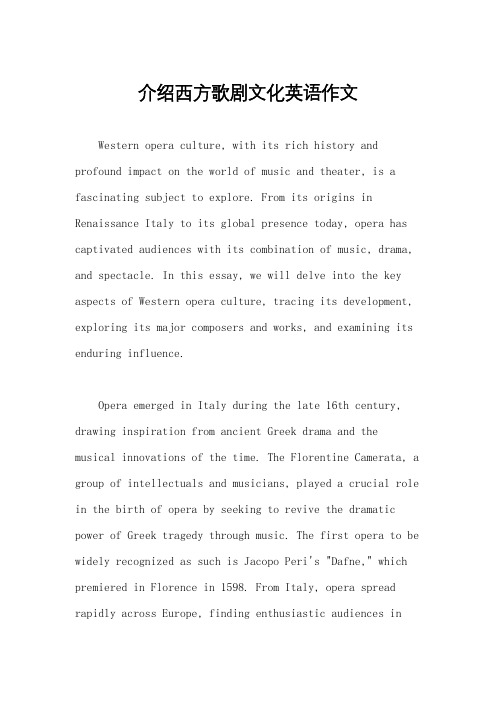
介绍西方歌剧文化英语作文Western opera culture, with its rich history and profound impact on the world of music and theater, is a fascinating subject to explore. From its origins in Renaissance Italy to its global presence today, opera has captivated audiences with its combination of music, drama, and spectacle. In this essay, we will delve into the key aspects of Western opera culture, tracing its development, exploring its major composers and works, and examining its enduring influence.Opera emerged in Italy during the late 16th century, drawing inspiration from ancient Greek drama and the musical innovations of the time. The Florentine Camerata, a group of intellectuals and musicians, played a crucial role in the birth of opera by seeking to revive the dramatic power of Greek tragedy through music. The first opera to be widely recognized as such is Jacopo Peri's "Dafne," which premiered in Florence in 1598. From Italy, opera spread rapidly across Europe, finding enthusiastic audiences inFrance, Germany, and England.One of the defining features of opera is its synthesis of music and drama. Unlike other forms of musical theater, such as operetta or musicals, opera is primarily sung throughout, with the music serving as a vehicle for conveying emotion, character development, and narrative. This fusion of music and drama reached its zenith in the works of composers like Wolfgang Amadeus Mozart, whose operas, such as "The Marriage of Figaro" and "Don Giovanni," are celebrated for their sublime melodies, intricate orchestration, and psychological depth.In addition to Mozart, the history of opera is replete with towering figures whose contributions have shaped the art form. Giuseppe Verdi, often hailed as the greatest opera composer of the 19th century, composed a series of masterpieces, including "La Traviata," "Rigoletto," and "Aida," which remain staples of the operatic repertoire. Richard Wagner, on the other hand, revolutionized opera with his epic works, such as "The Ring Cycle" and "Tristan und Isolde," which pushed the boundaries of musicalexpression and theatrical spectacle.Opera is also characterized by its diverse range of styles and genres. From the grandeur of Italian opera seria to the emotional intensity of German Romantic opera, from the wit and charm of French opera comique to the avant-garde experimentation of 20th-century opera, the art form has constantly evolved and adapted to changing tastes and cultural currents. This diversity is reflected in the countless opera houses and festivals around the world,where audiences can experience everything from classic repertoire to contemporary works.Moreover, opera has had a profound impact beyond the confines of the theater, influencing literature, visual art, film, and popular culture. Opera scenes have been depictedin countless novels, paintings, and films, while operatic themes and motifs have permeated everything fromadvertising jingles to Hollywood blockbusters. The enduring popularity of opera highlights its timeless appeal and universal resonance, as well as its ability to speak to the deepest emotions and aspirations of humanity.In conclusion, Western opera culture is a rich and multifaceted phenomenon that has captivated audiences for centuries. From its humble beginnings in Renaissance Italy to its global reach today, opera continues to inspire and enchant with its blend of music, drama, and spectacle. By exploring the works of its greatest composers, tracing its historical development, and examining its enduring influence, we gain a deeper appreciation for this timeless art form and its significance in the cultural landscape.。
西方文化英文简介

Restless waves Aphrodite
Ελευθερία ή θάνατος (E-lef-the-ri-a i Tha-na-tos )
Orthodoxy
Chaos
Gaea Tartarus
['dʒi:ə]
['tɑ:tərəs]
god of agriculture
Cronus
goddess of plenty
Rhea
Hestia Demeter
goddess of agriculture
goddess of the hearth and its fire
Hera Zeus
the lord of the universe
wife of Zeus goddess of women & marriage
• Place: around the Mediterranean Sea
• People: the Greeks,
the Jews
• Language: Hellenic (古希腊語), Hebrew
• Literature: mythological,
religious
• Classics: the Homeric epics, The Bible
Gaea
(the earth mother earth)
Ouranos
(the heavy lord of the universe )
6 Titans & 6 Titanesses
Coeus
Crius
Cronus
(lord of the universe )
英文版 西方文化热

• There are several possible reasons for this phenomenon. First, western nations, such as the United States and Britain, are powerful and dominant in every aspect. Everything in these countries is assumed to be superior and adored by some modern young people.
Boast
vt. 夸口说, 自吹自擂说;以有…而 自豪 n. 自夸;值得夸耀的事 物,引以为荣的事物 vi. 自吹自擂
Pursue vi. 追赶;
继续进行 vt. 继续;从事;追 赶;纠缠 追求
priceless n. 非
卖品 adj. 无价的;极 贵重的;非常有 趣的 巴黎拜金女
On the contrary , they turn to pursue enthusiastically a supposedly more modern culture. If this trend is allowed to continue , the priceless heritage of our ancestors will be replaced by western traditions.
dominant n. 显性 adj. 显性的;占优势的; 支配的,统治的 Assumed adj. 假
定的;假装的 设想的 假设的
• Second , the prevalence of globalization enable western culture to flood in China . Overwhelmed by such a trend , Chinese unconsciously get involved in western culture.
西方节日的盛行英语作文
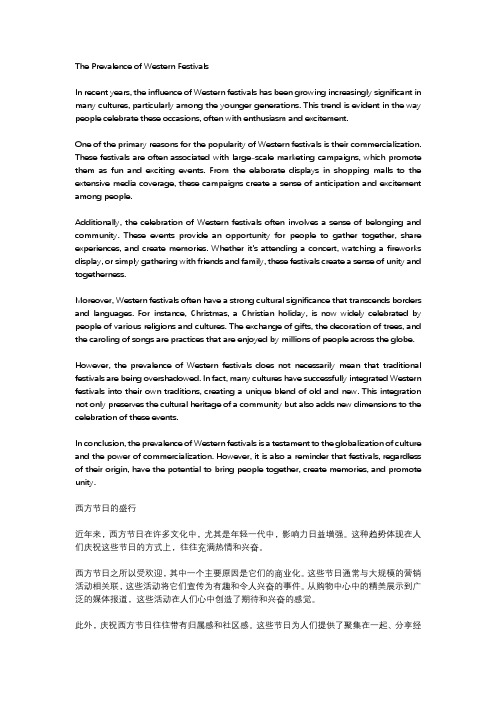
The Prevalence of Western FestivalsIn recent years, the influence of Western festivals has been growing increasingly significant in many cultures, particularly among the younger generations. This trend is evident in the way people celebrate these occasions, often with enthusiasm and excitement.One of the primary reasons for the popularity of Western festivals is their commercialization. These festivals are often associated with large-scale marketing campaigns, which promote them as fun and exciting events. From the elaborate displays in shopping malls to the extensive media coverage, these campaigns create a sense of anticipation and excitement among people.Additionally, the celebration of Western festivals often involves a sense of belonging and community. These events provide an opportunity for people to gather together, share experiences, and create memories. Whether it's attending a concert, watching a fireworks display, or simply gathering with friends and family, these festivals create a sense of unity and togetherness.Moreover, Western festivals often have a strong cultural significance that transcends borders and languages. For instance, Christmas, a Christian holiday, is now widely celebrated by people of various religions and cultures. The exchange of gifts, the decoration of trees, and the caroling of songs are practices that are enjoyed by millions of people across the globe.However, the prevalence of Western festivals does not necessarily mean that traditional festivals are being overshadowed. In fact, many cultures have successfully integrated Western festivals into their own traditions, creating a unique blend of old and new. This integration not only preserves the cultural heritage of a community but also adds new dimensions to the celebration of these events.In conclusion, the prevalence of Western festivals is a testament to the globalization of culture and the power of commercialization. However, it is also a reminder that festivals, regardless of their origin, have the potential to bring people together, create memories, and promote unity.西方节日的盛行近年来,西方节日在许多文化中,尤其是年轻一代中,影响力日益增强。
西方文化英文小作文
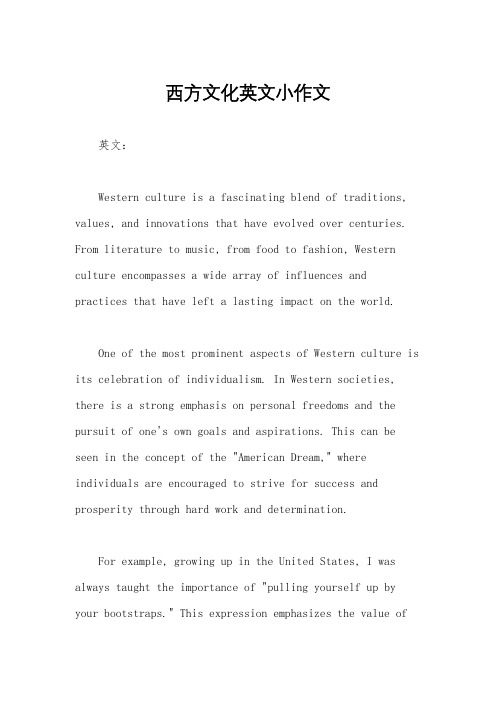
西方文化英文小作文英文:Western culture is a fascinating blend of traditions, values, and innovations that have evolved over centuries. From literature to music, from food to fashion, Western culture encompasses a wide array of influences and practices that have left a lasting impact on the world.One of the most prominent aspects of Western culture is its celebration of individualism. In Western societies, there is a strong emphasis on personal freedoms and the pursuit of one's own goals and aspirations. This can be seen in the concept of the "American Dream," where individuals are encouraged to strive for success and prosperity through hard work and determination.For example, growing up in the United States, I was always taught the importance of "pulling yourself up by your bootstraps." This expression emphasizes the value ofself-reliance and perseverance in the face of challenges.It speaks to the belief that individuals have the power to shape their own destinies through their actions and choices.Another hallmark of Western culture is its richartistic heritage. From Shakespearean plays to Hollywood blockbusters, Western literature and cinema have captivated audiences around the globe. Western music, too, has had a profound influence on popular culture, with genres likerock and roll and hip-hop originating in the West and spreading to every corner of the world.In my own experience, I've found that Western culture places a high value on innovation and progress. Whetherit's in the fields of science, technology, or business, Western societies are constantly pushing the boundaries of what is possible. This spirit of innovation has led to groundbreaking discoveries and advancements that have improved the lives of people everywhere.中文:西方文化是一个迷人的传统、价值观和创新的融合体,已经演变了几个世纪。
欧美文化作文英文

欧美文化作文英文Title: Exploring the Richness of Western Culture。
Western culture, a tapestry woven with threads of history, art, literature, and innovation, stands as a beacon of civilization's progress. From the vibrant streets of Paris to the bustling theaters of Broadway, the essence of Western culture permeates every aspect of our lives, shaping our identities and influencing global trends. In this essay, we delve into the multifaceted layers of Western culture, exploring its profound impact on the world stage.At the heart of Western culture lies its rich history, a saga of triumphs, setbacks, and revolutions that have shaped the modern world. The legacy of ancientcivilizations such as Greece and Rome echoes through the corridors of time, influencing everything from political systems to architectural marvels. The Renaissance, apivotal era of rebirth and enlightenment, gave birth tomasterpieces of art and literature that continue to inspire awe centuries later.Literature, another cornerstone of Western culture, serves as a window into the collective consciousness of its people. From the epic poems of Homer to the philosophical musings of Shakespeare, Western literature reflects the complexity of human experience in all its glory and despair. The works of Dickens, Austen, and Hemingway offer poignant insights into societal norms, individual struggles, and the eternal quest for meaning.Art, in its myriad forms, is a testament to thecreative genius of Western civilization. The canvases of Da Vinci, Van Gogh, and Picasso capture the imagination with their vibrant colors and bold strokes, transcending timeand space to evoke emotions that resonate with audiences worldwide. From classical sculptures to avant-garde installations, Western art pushes the boundaries of expression, challenging viewers to see the world through new eyes.Music, the universal language of the soul, finds its home in the heart of Western culture. From the haunting melodies of Mozart to the electrifying beats of rock and roll, Western music encompasses a diverse range of styles and genres that reflect the cultural mosaic of its people. Whether it's the symphonies of Beethoven or the improvisations of jazz legends like Louis Armstrong, Western music has the power to move, inspire, and unite people from all walks of life.Science and innovation are also integral components of Western culture, driving progress and pushing the boundaries of human knowledge. From the scientific revolution to the digital age, Western thinkers and inventors have revolutionized the way we live, work, and communicate. The inventions of Edison, Tesla, and Jobs have transformed society, ushering in an era of unprecedented technological advancement.Yet, for all its achievements, Western culture is not without its challenges and controversies. The legacy of colonialism, the struggle for civil rights, and the ongoingdebate over cultural appropriation are just a few examples of the complex issues that continue to shape the discourse surrounding Western culture. As we navigate the complexities of our globalized world, it is essential to critically examine the impact of Western culture on both local and global communities, acknowledging its contributions while also recognizing its limitations and shortcomings.In conclusion, Western culture is a tapestry woven with the threads of history, art, literature, and innovation. It is a living, breathing testament to the resilience, creativity, and diversity of the human spirit. By embracing its complexities and engaging in meaningful dialogue, we can continue to celebrate the richness of Western culture while also working towards a more inclusive and equitable future for all.。
English西方文化介绍

6班 25号
西方主要节日 ▪ 新年 ( 1月1日) ▪ 情人节 ( 2月14日) ▪ 愚人节 ( 4月1日) ▪ 复活节 ( 春分月圆后首个周日) ▪ 万圣节前夜 ( 10月31日) ▪ 万圣节 ( 11月1日) ▪ 感恩节 ( 11月的第四个星期四) ▪ 圣诞节 ( 12月25日) ▪ 平安夜 ( 12月24日)
感恩节是美国民间传统节日。时间是每年11月的第四 个星期四(the4th Thursday in November)。 感恩节 感恩节的起源有一段有趣但很复杂的历史,这一段历史要 从英国的宗教史说起。大约16世纪中叶,在英国教会() 内出现了改革派。他们主张清除教会内残留的天主教旧制 和烦琐的礼仪,取消教堂内华丽的装饰,反对封建王公贵 族的骄奢淫逸,主张过勤俭清洁的简朴生活,因而被人称 为清教徒()。清教徒中又分为温和派和激进派。温和派 主张君主立宪,代表大资产阶级和上层新贵族的利益。激 进派则提倡共和政体,坚持政教分离,主张用长老制改组 国会,代表中小资产阶级贵族的利益,后来遭到当局的迫 害,部分清教徒于是被迫逃亡国外。1620年9月,102名英 国清教徒乘坐“五月花”号木船(Mayflower)从英格兰 的普利茅斯(Plymouth)出发,
在西方国家,尽管圣诞节才是 Calendar 犹太历七月的第一 最大的节日,新年在人们心目中仍 天;伊斯兰教历第一个 占有不可替代的重要地位。除夕之 月的第一天;格列高利 夜 (NewYear\'s Day)晚会是庆 历 (Gregorian 祝新年到来必不可少的活动。西方 calendar),公历或阳历。 各国的人们都喜欢在欢快的乐曲和 为纪念1582年罗马教皇 绚丽的光彩中喜气洋洋地度过一年 格列高利十三世 的最后一个夜晚。此时,化装晚会 (Pope Gregory XIII) 特别受欢迎。来宾们把尊严和谨慎 采用此历而命名的。按 阳历或公历,新年从1 藏在面具之后,打扮得稀奇古怪。 月1日(January 1)开 大家无拘无束,尽情玩乐,与平日 始。在元旦这一天,人 的行为大相径庭。在英美两国,午 夜钟声一响,参加晚会的人们还要 们辞旧迎新(to see the old year out and 手 拉手高唱"友谊地久天长"这首著 the new year in)。 名的苏格兰民歌。
中西文化差异(英文版)

princess flees to the forest, because stepmother envy her beauty. The seven dwarfs help her. In their help, the snow white overcome the stepmother’s curse and find love.
中国第一部动画片《大闹画室》(1926年) 中国第一部动画片《 画室》 1926年 Chinese first animated film “make studio”
中国第一部彩色动画电影《大闹天宫》 中国第一部彩色动画电影《大闹天宫》(1961年1964年) 年 年 Chinese first colorful animated film“ make heaven ”
Difference culture between China and the West
中西方文化差异
-------------------about animation
关于动画
[mə'tju 'tjuə] mature [m 'tju ] adj. ['pæʃə ʃənit] passionate ['pæʃənit] adj. 热 热 [plɔ plot [plɔt] n. 节;图;阴谋 [i‘niʃə ʃəl] 期 initial stage [i‘niʃəl]
Snow White
flee [fli:]vi. 逃走;消失,消散 vt.逃走;逃 逃走;消失, 逃走; 逃走 避 stepmother ['step,mʌðə] n. 继母,后母 ʌ 继母, envy [‘envi] n. 嫉妒,妒忌;羡慕 vt. 嫉 嫉妒,妒忌; 妒忌; 妒,妒忌;羡慕 overcome [,əuvə'kʌm] vt. 克服;胜过 vi 克服; ʌ
西方文化集锦英文作文
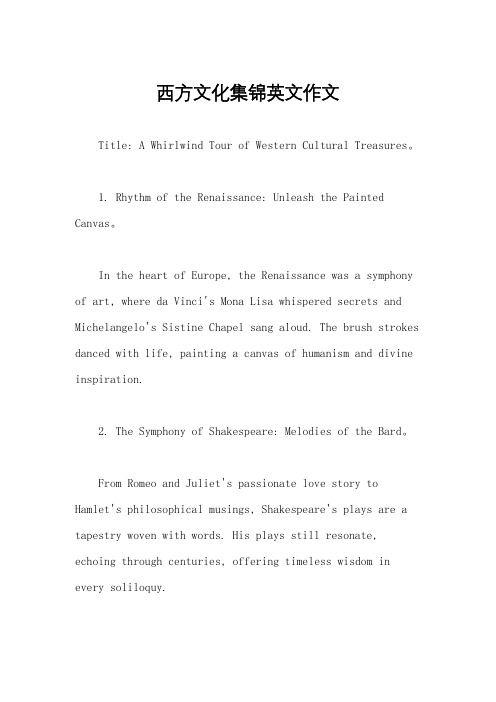
西方文化集锦英文作文Title: A Whirlwind Tour of Western Cultural Treasures。
1. Rhythm of the Renaissance: Unleash the Painted Canvas。
In the heart of Europe, the Renaissance was a symphony of art, where da Vinci's Mona Lisa whispered secrets and Michelangelo's Sistine Chapel sang aloud. The brush strokes danced with life, painting a canvas of humanism and divine inspiration.2. The Symphony of Shakespeare: Melodies of the Bard。
From Romeo and Juliet's passionate love story to Hamlet's philosophical musings, Shakespeare's plays are a tapestry woven with words. His plays still resonate, echoing through centuries, offering timeless wisdom in every soliloquy.3. The Symphony of Music: Beethoven's Symphony No. 5。
Beethoven's Fifth Symphony, a symphony of power and resilience, echoes the spirit of the Enlightenment. Its dramatic crescendos symbolize the human quest for freedom, resonating with the rebellious soul of the West.4. The Architectural Symphony: Gothic cathedrals。
英语作文万能模板西方文化
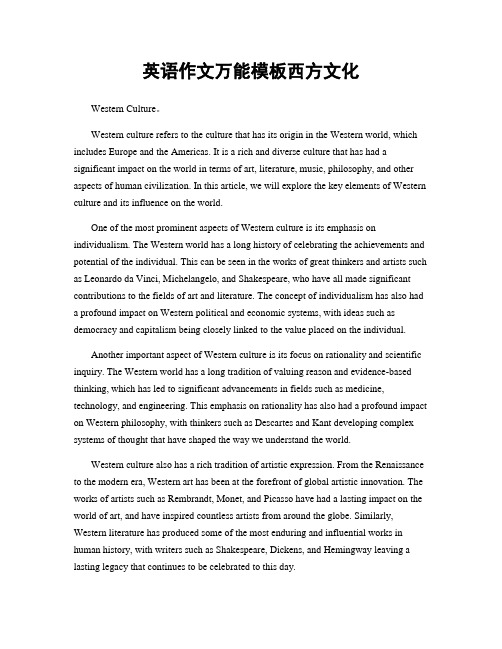
英语作文万能模板西方文化Western Culture。
Western culture refers to the culture that has its origin in the Western world, which includes Europe and the Americas. It is a rich and diverse culture that has had a significant impact on the world in terms of art, literature, music, philosophy, and other aspects of human civilization. In this article, we will explore the key elements of Western culture and its influence on the world.One of the most prominent aspects of Western culture is its emphasis on individualism. The Western world has a long history of celebrating the achievements and potential of the individual. This can be seen in the works of great thinkers and artists such as Leonardo da Vinci, Michelangelo, and Shakespeare, who have all made significant contributions to the fields of art and literature. The concept of individualism has also had a profound impact on Western political and economic systems, with ideas such as democracy and capitalism being closely linked to the value placed on the individual.Another important aspect of Western culture is its focus on rationality and scientific inquiry. The Western world has a long tradition of valuing reason and evidence-based thinking, which has led to significant advancements in fields such as medicine, technology, and engineering. This emphasis on rationality has also had a profound impact on Western philosophy, with thinkers such as Descartes and Kant developing complex systems of thought that have shaped the way we understand the world.Western culture also has a rich tradition of artistic expression. From the Renaissance to the modern era, Western art has been at the forefront of global artistic innovation. The works of artists such as Rembrandt, Monet, and Picasso have had a lasting impact on the world of art, and have inspired countless artists from around the globe. Similarly, Western literature has produced some of the most enduring and influential works in human history, with writers such as Shakespeare, Dickens, and Hemingway leaving a lasting legacy that continues to be celebrated to this day.In addition to art and literature, Western culture has also made significant contributions to the world of music. From classical composers such as Bach and Beethoven to modern pop and rock artists, Western music has had a profound impact on global culture. The Western world has also been at the forefront of technological innovation, with inventions such as the printing press, the steam engine, and the internet revolutionizing the way we communicate and interact with the world.The influence of Western culture can be seen in many aspects of global society. From the spread of democracy and human rights to the global popularity of Western fashion and cuisine, the impact of Western culture is felt in every corner of the world. This influence has not been without controversy, as some critics argue that Western cultural imperialism has led to the erosion of traditional cultures and values in other parts of the world. However, it is undeniable that Western culture has played a significant role in shaping the modern world and continues to be a driving force in global cultural exchange.In conclusion, Western culture is a rich and diverse tradition that has had a profound impact on the world. From its emphasis on individualism and rationality to its contributions to art, literature, music, and technology, Western culture has shaped the way we understand and interact with the world. While its influence has not been without controversy, it is clear that Western culture will continue to play a significant role in global cultural exchange for years to come.。
风俗习惯(中西方差异)英语版

夏威夷的风俗习惯如果想要真正地了解夏威夷的风俗习惯,就必须了解夏威夷在白人文明进入之前的习俗,即夏威夷卡普制度时期的风俗习惯。
卡普制度是在1820年左右消亡的(参阅"卡普制度")。
直到现在,很多传统的夏威夷人还是认为,枕头是不可以用脚踩、也不可以坐的。
男人出海打鱼,家里人不可以问他上哪里,也不可以在男人离家期间招待客人,下海的人不可以带随行香蕉,否则就会倒霉。
作者作为女人,又生活在夏威夷,真的是非常庆幸以上这些习俗随着基督教义的传播到了1820左右都已经没有了。
但尽管这样,历史的痕迹偶尔也会在后代中显现,本人也有所经历。
以下这些生活的习俗,在某些土著居民区偶尔还会碰到,如果你来夏威夷,入境问俗,说不定能派上用场。
带花夏威夷人送鲜花做成的花环表示欢或祝贺,他(她)会为你带在脖子上。
你接受了以后不要马上取下来,你也不能马上就摘下来转赠他人,除非你转赠的对象是你的家庭成员。
否则会被认为很不礼貌。
行为做贼的人手会痛而且会生癣,淫乱的男人下体会痛。
走路时脚无故地痛起来的人要小心,可能你走错路了。
丧葬家里有人生病或受伤需要抬出门外,必须脚先脑后。
如果头先脚后地抬,会被认为是抬死人,很不吉利。
家里死了人,夏威夷的习惯是必须全家举哀,哭得越悲切越好。
很多家里人因此敲掉门牙,自残自己的面容和身体,表示最诚挚的哀悼。
百闻不如一见,欢迎你来夏威夷一玩!为方便你的旅游做计划和做预算,请参看我们网站的"精打细算的旅游套票"。
对外交往中的西方礼节与风俗习惯文化主要是指人类所创造的物质财富和精神财富以及社会化行为的积淀,它包括信仰、艺术、道德、风俗、习惯等,是一个复杂的总体,具有鲜明的时代性、民族性和地域性。
生活在某一地区的每个成员,都会自觉或不自觉地受到该地区文化的熏陶和影响,对该地区的文化有着天然的认同感,并形成共同的文化心理特征。
在对外交流和交往过程中,了解作为西方文化重要组成部分的西方礼节与风俗习惯可以帮助我们跨越由于文化障碍所造成的鸿沟,成功而迅速地达到交际的目的。
西方文化英语作文

西方文化英语作文Western culture is a diverse and vibrant mix of traditions, customs, and beliefs. From the music and movies we love to the food we eat, Western culture is constantly evolving and influencing the world around us.One of the most iconic aspects of Western culture isits music. From rock and roll to hip hop, Western music has had a huge impact on global culture. Whether it's the catchy tunes of pop music or the soulful melodies of jazz, Western music has a way of bringing people together and creating a sense of unity.When it comes to food, Western culture offers a wide range of delicious options. From juicy burgers and crispy fries to gourmet pasta and fine dining, there's something for everyone to enjoy. And let's not forget about the sweet treats like cupcakes, donuts, and ice cream that make indulging in dessert a guilty pleasure.In addition to music and food, Western culture is also known for its fashion and style. From the latest trends in clothing to the hottest accessories, Western fashion is all about expressing individuality and creativity. Whether it's the classic elegance of a little black dress or the edgy vibe of ripped jeans and a leather jacket, Western fashionis always making a statement.Another key aspect of Western culture is its emphasison individualism and personal freedom. In Western societies, people are encouraged to express themselves and pursuetheir own dreams and aspirations. This focus onindividuality has led to a culture that values diversityand celebrates the unique qualities that make each person special.Overall, Western culture is a dynamic and ever-changing force that continues to shape the world we live in. Fromits music and food to its fashion and values, Westernculture has a lasting impact on global society and will continue to influence the way we live for years to come.。
西方节日的盛行英语作文
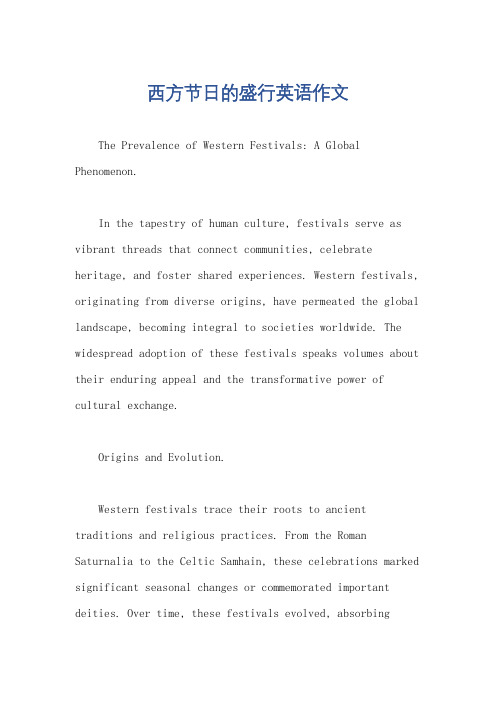
西方节日的盛行英语作文The Prevalence of Western Festivals: A Global Phenomenon.In the tapestry of human culture, festivals serve as vibrant threads that connect communities, celebrate heritage, and foster shared experiences. Western festivals, originating from diverse origins, have permeated the global landscape, becoming integral to societies worldwide. The widespread adoption of these festivals speaks volumes about their enduring appeal and the transformative power of cultural exchange.Origins and Evolution.Western festivals trace their roots to ancient traditions and religious practices. From the Roman Saturnalia to the Celtic Samhain, these celebrations marked significant seasonal changes or commemorated important deities. Over time, these festivals evolved, absorbinginfluences from Christianity and blending with local customs. The resulting hybrid traditions showcased the dynamic nature of cultural interaction.Christmas: A Global Icon.Among Western festivals, Christmas stands as the most widely celebrated. Originating as a Christian holiday commemorating the birth of Jesus, it has morphed into a secular event marked by gift-giving, festive gatherings,and the iconic Santa Claus figure. Christmas transcends religious boundaries, becoming a symbol of joy, generosity, and family togetherness in cultures across the globe.Halloween: Spooky and Enchanting.Halloween, with its origins in Celtic traditions, has become a global phenomenon that celebrates the mystical realm. Children don costumes and knock on doors for treats, while adults indulge in horror movies and spooky parties. Halloween's popularity stems from its playful blend of fear, excitement, and the allure of the supernatural.Thanksgiving: Gratitude and Abundance.Thanksgiving, a uniquely American holiday, celebrates the harvest and the blessings of life. Rooted in English and Puritan traditions, Thanksgiving has spread to other countries, fostering gratitude for bountiful resources and the bonds of community. The traditional meal of turkey, mashed potatoes, and stuffing evokes feelings of warmth, family, and shared prosperity.Valentine's Day: Love and Romance.Valentine's Day, inspired by the Roman festival of Lupercalia, has become a global emblem of love and romance. Originally celebrated to purify the city, it evolved into a day of amorous expressions. Today, Valentine's Day is marked by exchanging gifts, cards, and tokens of affection, reminding us of the enduring power of human connection.Cultural Significance.The prevalence of Western festivals in diversesocieties highlights their universal appeal. These celebrations provide opportunities for people to connect with their heritage, express their creativity, and experience the joy of shared traditions. They create a sense of belonging and foster a shared cultural identity, bridging geographical and cultural divides.However, the adoption of Western festivals also raises questions about cultural appropriation and the potential erasure of local traditions. It is essential to approach these celebrations with respect for their origins and to maintain a balance between embracing diversity and preserving cultural distinctiveness.Conclusion.The widespread celebration of Western festivals across the globe is a testament to the interconnectedness of human culture. From the iconic Christmas tree to the spooky Halloween pumpkin, these traditions have become ingrainedin our collective consciousness, fostering bonds, sparkingjoy, and enriching the human experience. As we navigate the complexities of cultural exchange, it is crucial to recognize the beauty and significance of both local and global traditions, allowing them to coexist harmoniously and contribute to the vibrant tapestry of global culture.。
西方文化 英语作文
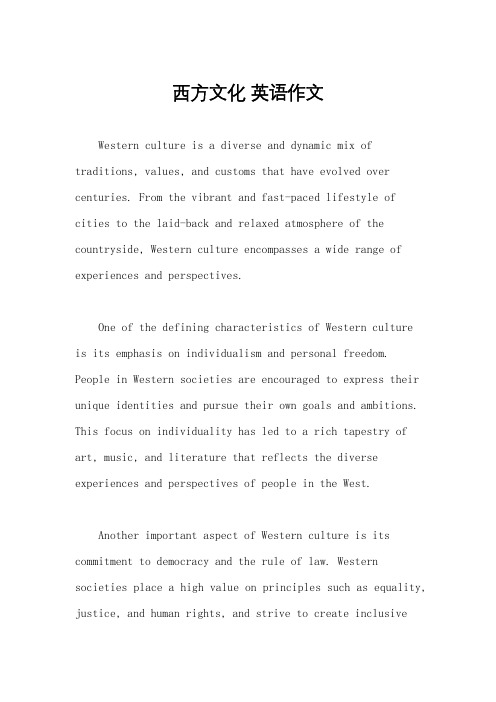
西方文化英语作文Western culture is a diverse and dynamic mix of traditions, values, and customs that have evolved over centuries. From the vibrant and fast-paced lifestyle of cities to the laid-back and relaxed atmosphere of the countryside, Western culture encompasses a wide range of experiences and perspectives.One of the defining characteristics of Western cultureis its emphasis on individualism and personal freedom. People in Western societies are encouraged to express their unique identities and pursue their own goals and ambitions. This focus on individuality has led to a rich tapestry of art, music, and literature that reflects the diverse experiences and perspectives of people in the West.Another important aspect of Western culture is its commitment to democracy and the rule of law. Western societies place a high value on principles such as equality, justice, and human rights, and strive to create inclusiveand fair systems of governance. This commitment to democratic ideals has had a profound impact on the development of Western societies and has helped to shape their values and institutions.In addition, Western culture is known for its strong tradition of innovation and progress. From the scientific revolution to the technological advancements of the modern era, Western societies have been at the forefront of discovery and development. This spirit of innovation has led to groundbreaking achievements in fields such as medicine, engineering, and communication, and has had a lasting impact on the way people live and work around the world.Overall, Western culture is a vibrant and multifaceted tapestry of traditions, values, and customs that continues to evolve and adapt to the changing world. Its commitment to individualism, democracy, and innovation has helped to shape the global landscape and has left an indelible mark on the course of human history.。
开放式英语作文西方文化
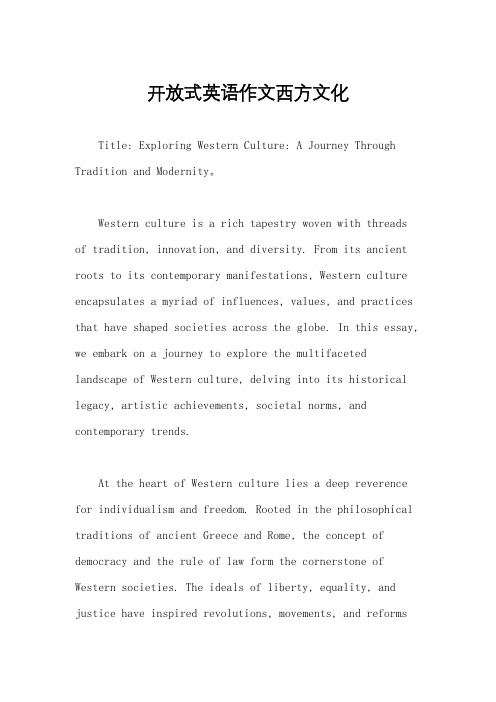
开放式英语作文西方文化Title: Exploring Western Culture: A Journey Through Tradition and Modernity。
Western culture is a rich tapestry woven with threads of tradition, innovation, and diversity. From its ancient roots to its contemporary manifestations, Western culture encapsulates a myriad of influences, values, and practices that have shaped societies across the globe. In this essay, we embark on a journey to explore the multifaceted landscape of Western culture, delving into its historical legacy, artistic achievements, societal norms, and contemporary trends.At the heart of Western culture lies a deep reverence for individualism and freedom. Rooted in the philosophical traditions of ancient Greece and Rome, the concept of democracy and the rule of law form the cornerstone of Western societies. The ideals of liberty, equality, and justice have inspired revolutions, movements, and reformsthroughout history, shaping the political landscape of the Western world.One cannot discuss Western culture without acknowledging its profound contributions to the arts and humanities. From the masterpieces of Renaissance painters like Leonardo da Vinci and Michelangelo to the groundbreaking literary works of Shakespeare and Dickens, Western artistic expression has captivated audiences for centuries. The legacy of classical music composers such as Mozart, Beethoven, and Bach continues to resonate across generations, enriching our collective cultural heritage.In addition to its artistic achievements, Western culture has also been a crucible of scientific innovation and technological advancement. The Enlightenment era, with its emphasis on reason, empiricism, and human progress, laid the groundwork for modern science and the Industrial Revolution. The discoveries of pioneers like Isaac Newton, Albert Einstein, and Marie Curie have transformed our understanding of the natural world and propelled humanity into the age of space exploration and digital revolution.Beyond its intellectual and artistic pursuits, Western culture encompasses a diverse array of social norms, customs, and traditions. The concept of the nuclear family, with its emphasis on monogamy and parental responsibility, has been a central institution in Western societies for centuries. However, the definition of family and gender roles has evolved over time, reflecting changing attitudes towards marriage, sexuality, and gender equality.Moreover, the cultural landscape of the Western worldis characterized by its rich tapestry of ethnicities, religions, and lifestyles. Immigration and globalization have brought together people from diverse backgrounds, contributing to the vibrant multiculturalism of Western societies. From the bustling streets of New York City to the quaint villages of rural England, the fusion of different cultures and traditions has enriched the fabric of Western culture, fostering a spirit of tolerance, inclusivity, and cosmopolitanism.In the realm of popular culture, Western influencelooms large, shaping trends in fashion, music, film, and entertainment worldwide. From Hollywood blockbusters to chart-topping music hits, Western cultural exports dominate the global market, serving as a reflection of its soft power and cultural hegemony. However, the rise of digital media and social networking platforms has also democratized cultural production, giving voice to marginalized communities and alternative perspectives.In conclusion, Western culture is a dynamic and multifaceted phenomenon that encompasses a rich tapestry of tradition and modernity. From its philosophical foundations to its artistic achievements, from its societal norms toits popular culture, Western culture continues to shape and be shaped by the forces of history, innovation, and globalization. As we navigate the complexities of the 21st century, understanding and appreciating the diversity of Western culture is essential for fostering dialogue, empathy, and mutual understanding in an interconnected world.。
西方文化的影响英语作文

西方文化的影响英语作文Western Culture and Its Influence on English。
As the most widely spoken language in the world, English has been greatly influenced by Western culture. The impact of Western culture on the English language can be seen in various aspects, such as vocabulary, grammar, and pronunciation. In this essay, we will explore the influence of Western culture on the English language and how it has shaped the language we use today.One of the most noticeable influences of Westernculture on English is the vocabulary. Many English words have been borrowed from Western languages, such as Latin, French, and German. For example, words like "ballet," "champagne," and "cuisine" have been borrowed from French, while words like "algebra," "guitar," and "safari" have been borrowed from Arabic and Swahili. These borrowed words have enriched the English vocabulary and have become an integral part of the language.In addition to borrowed words, Western culture has also influenced the development of new words in English. With the rise of Western technology and innovation, new words and terms have been introduced into the English language. Words like "internet," "computer," and "smartphone" have become commonplace in English, reflecting the influence of Western culture on the language.Furthermore, Western culture has also influenced the grammar and syntax of the English language. The structure of English sentences and the use of tenses have been influenced by Western languages, such as Latin and Greek. For example, the use of the subjunctive mood in English is a reflection of its Latin influence, while the use of the past perfect tense is a reflection of its Germanic influence. These grammatical influences have shaped the way English is spoken and written today.Moreover, the pronunciation of English has also been influenced by Western culture. The introduction of new sounds and accents from Western languages has led tochanges in the pronunciation of English words. For example, the pronunciation of words like "ballet" and "cuisine" reflects their French origins, while the pronunciation of words like "algebra" and "guitar" reflects their Arabic and Spanish origins. These pronunciation influences have added diversity to the English language and have made it more dynamic and adaptable.In conclusion, Western culture has had a profound influence on the English language, shaping its vocabulary, grammar, and pronunciation. The borrowing of words from Western languages, the introduction of new words through technology and innovation, and the influence of Western grammar and pronunciation have all contributed to the development of English as a global language. As English continues to evolve, it will continue to be influenced by Western culture and will remain a reflection of the dynamic and diverse world we live in.Overall, the influence of Western culture on the English language has been significant and continues to shape the way we communicate and express ourselves. AsEnglish speakers, we should be aware of the impact of Western culture on our language and embrace the diversity and richness it brings.。
介绍西方歌剧文化英语作文
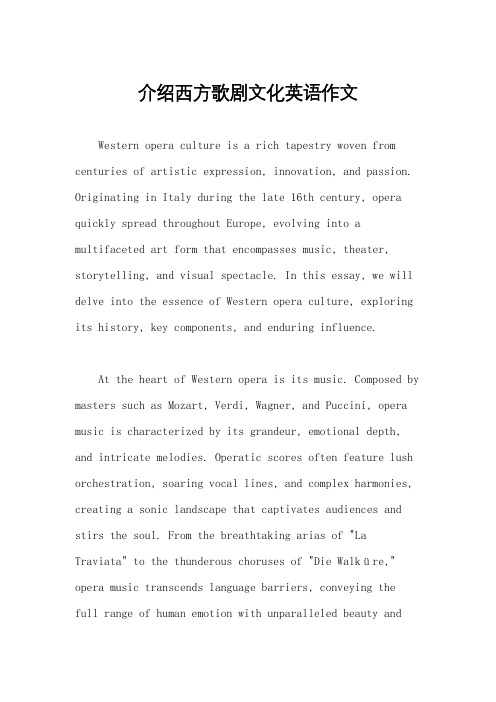
介绍西方歌剧文化英语作文Western opera culture is a rich tapestry woven from centuries of artistic expression, innovation, and passion. Originating in Italy during the late 16th century, opera quickly spread throughout Europe, evolving into a multifaceted art form that encompasses music, theater, storytelling, and visual spectacle. In this essay, we will delve into the essence of Western opera culture, exploring its history, key components, and enduring influence.At the heart of Western opera is its music. Composed by masters such as Mozart, Verdi, Wagner, and Puccini, opera music is characterized by its grandeur, emotional depth, and intricate melodies. Operatic scores often feature lush orchestration, soaring vocal lines, and complex harmonies, creating a sonic landscape that captivates audiences and stirs the soul. From the breathtaking arias of "La Traviata" to the thunderous choruses of "Die Walküre," opera music transcends language barriers, conveying thefull range of human emotion with unparalleled beauty andpower.In addition to its music, Western opera is renowned for its theatricality. Elaborate sets, lavish costumes, and innovative staging combine to create immersive worlds that transport audiences to distant lands and bygone eras. Opera houses such as La Scala in Milan, the Metropolitan Opera in New York, and the Royal Opera House in London are revered for their opulent productions and world-class performances, attracting opera lovers from around the globe.Central to the operatic experience are the singers, whose extraordinary voices bring the music to life. Opera singers undergo years of rigorous training to master the demanding vocal techniques required to perform on stage. From the coloratura sopranos with their dazzling high notes to the heroic tenors with their stirring power, operaoffers a showcase for a diverse array of vocal talents. Singers not only possess exceptional vocal abilities but also imbue their performances with dramatic intensity, creating unforgettable portrayals of iconic characters like Carmen, Tosca, and Don Giovanni.Beyond its artistic merits, Western opera holds a mirror to society, reflecting the cultural, political, and philosophical currents of its time. Operas such as "The Marriage of Figaro" and "Carmen" explore themes of love, betrayal, and social inequality, while works like "Nabucco" and "Aida" grapple with issues of power, nationalism, and identity. Through its stories and characters, opera confronts the human condition with honesty and empathy, challenging audiences to confront their own beliefs and prejudices.Despite its centuries-old tradition, Western opera remains a vibrant and evolving art form, constantly adapting to the changing tastes and sensibilities of contemporary audiences. Modern interpretations of classic operas breathe new life into familiar works, infusing them with fresh perspectives and relevance. Similarly, contemporary operas tackle timely subjects and experiment with innovative forms, pushing the boundaries of what opera can be in the 21st century.In conclusion, Western opera culture is a testament to the enduring power of human creativity and expression. With its transcendent music, captivating theater, and profound storytelling, opera continues to enchant and inspire audiences around the world. As we look to the future, let us celebrate the rich legacy of Western opera while also embracing its capacity for innovation and renewal.。
西方文化交际英语作文
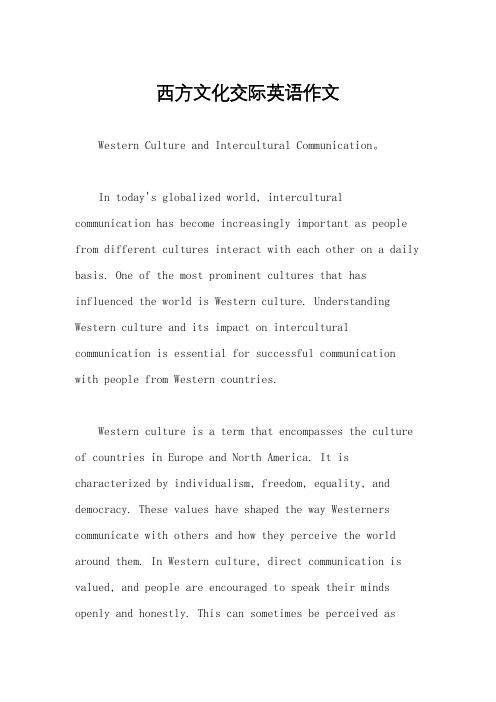
西方文化交际英语作文Western Culture and Intercultural Communication。
In today's globalized world, intercultural communication has become increasingly important as people from different cultures interact with each other on a daily basis. One of the most prominent cultures that has influenced the world is Western culture. Understanding Western culture and its impact on intercultural communication is essential for successful communication with people from Western countries.Western culture is a term that encompasses the culture of countries in Europe and North America. It is characterized by individualism, freedom, equality, and democracy. These values have shaped the way Westerners communicate with others and how they perceive the world around them. In Western culture, direct communication is valued, and people are encouraged to speak their minds openly and honestly. This can sometimes be perceived asrude or aggressive by individuals from other cultures who are used to more indirect forms of communication.One of the key aspects of Western culture that influences intercultural communication is the concept of personal space. Westerners value their personal space and prefer to maintain a certain distance from others when communicating. This can be challenging for individuals from cultures that are more comfortable with close physical proximity. Understanding and respecting these differencesin personal space is crucial for effective communication with Westerners.Another important aspect of Western culture thataffects intercultural communication is the use of nonverbal communication. Westerners rely heavily on nonverbal cues such as facial expressions, gestures, and body language to convey their thoughts and emotions. It is important to be aware of these nonverbal cues and their meanings in order to avoid misunderstandings and miscommunications.In addition to nonverbal communication, language alsoplays a crucial role in intercultural communication with Westerners. English is the most widely spoken language in the Western world, and proficiency in English can greatly facilitate communication with Westerners. However, it is important to be aware of cultural differences in language use, such as idioms, slang, and humor, which can varygreatly between cultures.In conclusion, understanding Western culture and its impact on intercultural communication is essential for successful communication with people from Western countries. By being aware of the values, norms, and communicationstyles of Western culture, individuals can navigate intercultural interactions more effectively and build stronger relationships with Westerners. Embracing cultural diversity and being open-minded are key to bridging the communication gap between different cultures and fostering mutual understanding and respect.。
西方文化影响英语作文

西方文化影响英语作文Western Culture Influence on English。
English, as one of the most widely spoken languages in the world, has been greatly influenced by Western culture. The impact of Western culture on the English language can be seen in various aspects, including vocabulary, grammar, and expressions. In this essay, we will explore how Western culture has shaped the English language and theimplications of this influence.One of the most significant ways in which Western culture has influenced the English language is through the adoption of vocabulary. Many English words have their origins in Western languages such as Latin, French, and German. For example, words like "restaurant," "ballet," and "piano" have all been borrowed from French, while wordslike "angst," "kindergarten," and "doppelganger" have been borrowed from German. This borrowing of vocabulary has enriched the English language and made it more diverse andinclusive.In addition to vocabulary, Western culture has also influenced the grammar and syntax of the English language. Many of the grammatical rules and structures in English are derived from Western languages, particularly Latin and Greek. For example, the use of articles ("a," "an," "the") in English is a feature borrowed from Latin, while the use of subjunctive mood in English is influenced by Latin grammar. Furthermore, the word order in English, which follows the subject-verb-object pattern, is also influenced by Western languages.Furthermore, Western culture has also impacted the expressions and idioms used in the English language. Many English expressions and idioms have their roots in Western culture, particularly in literature, philosophy, and religion. For example, expressions like "to be on cloud nine," "to have a chip on one's shoulder," and "to turn a blind eye" all have their origins in Western culture. These expressions not only enrich the English language but also provide insights into Western cultural values and beliefs.The influence of Western culture on the English language has far-reaching implications. On one hand, it has made the English language more accessible and adaptable to speakers of Western languages. The borrowing of vocabulary, grammar, and expressions from Western languages has made it easier for speakers of Western languages to learn and communicate in English. On the other hand, the influence of Western culture has also made the English language a global lingua franca, as it has become the language of international business, diplomacy, and communication.However, the influence of Western culture on the English language has also raised concerns about linguistic imperialism and cultural hegemony. Some critics argue that the dominance of Western culture in the English language has marginalized and eroded the linguistic and cultural diversity of non-Western societies. They argue that the imposition of Western cultural values and norms through the English language has led to the loss of indigenous languages and traditions.In conclusion, Western culture has had a profound influence on the English language, shaping its vocabulary, grammar, and expressions. While this influence has made the English language more diverse and inclusive, it has also raised concerns about linguistic imperialism and cultural hegemony. As English continues to evolve and adapt to the changing global landscape, it is important to recognize and respect the linguistic and cultural diversity of all societies.。
- 1、下载文档前请自行甄别文档内容的完整性,平台不提供额外的编辑、内容补充、找答案等附加服务。
- 2、"仅部分预览"的文档,不可在线预览部分如存在完整性等问题,可反馈申请退款(可完整预览的文档不适用该条件!)。
- 3、如文档侵犯您的权益,请联系客服反馈,我们会尽快为您处理(人工客服工作时间:9:00-18:30)。
vt. 夸口说, 自吹自擂说;以有…而 自豪 n. 自夸;值得夸耀的事 物,引以为荣的事物 vi. 自吹自擂
Pursue vi. 追赶;
继续进行 vt. 继续;从事;追 赶;纠缠 追求
priceless n. 非
卖品 adj. 无价的;极 贵重的;非常有 趣的 巴黎拜金女
On the contrary , they turn to pursue enthusiastically a supposedly more modern culture. If this trend is allowed to continue , the priceless heritage of our ancestors will be replaced by western traditions.
Globalization n.
全球化 经济全球化 国际化
Overwhelmed adj. 受宠若惊的,
使不知所措 v. 受打击,压 倒,被压得喘不 过气
In my opinion, I am critical of this trend , China boasts a brilliant history and splendid traditions. In modern times , Chinese tradition should be preserved and promoted. But it seems that young people no longer treasure the tradition.
Heritage
n. 遗产;传统; 继承物;继承 权 祖先传下来之 物
Nobody expects such a consequence . So let us join hand in hand to protect Chinese tradition.
What’s your feelings after you saw this phenomenon and pictures ? Do you agree to celebrate western holidays? Maybe everyone has his own answer !
Today what we say is about
The Prevalence of Western Holiday
Hope everyone will be interested in it !
Prevalence n. 流行;普遍;广泛 盛行率 普遍存在
First , let us see some pictures
That’s all , thank you for your attention !
• There are several possible reasons for this phenomenon. First, western nations, such as the United States and Britain, are powerful and dominant in every aspect. Everything in these countries is assumed to be superior and adored by some modern young people.
dominant n. 显性 adj. 显性的;占优势的; 支配的,统治的 Assumed adj. 假
定的;假装的 设想的 假设的
• Second , the prevalence of globalization enable western culture to flood in China . Overwhelmed by such a trend , Chinese unconsciously get involved in western culture.
These pictures show that more and more Chinese people are enjoy celebrating western holidays !
• It is noticeable that western holidays are becoming increasingly popular day by day, while Chinese traditional holidays are being somewhat neglected. Old people often complain that Chinese New Year has lost its real meaning. To their astonishment, young people in China, ignorant about Chinese traditional holidays, are crazy about Christmas or Valentine’s Day.
But as a Chinese ,I think ,it is our duty to protect our traditions. So I hope all of us to celebrate our traditional holidays and spread Chinese culture.
